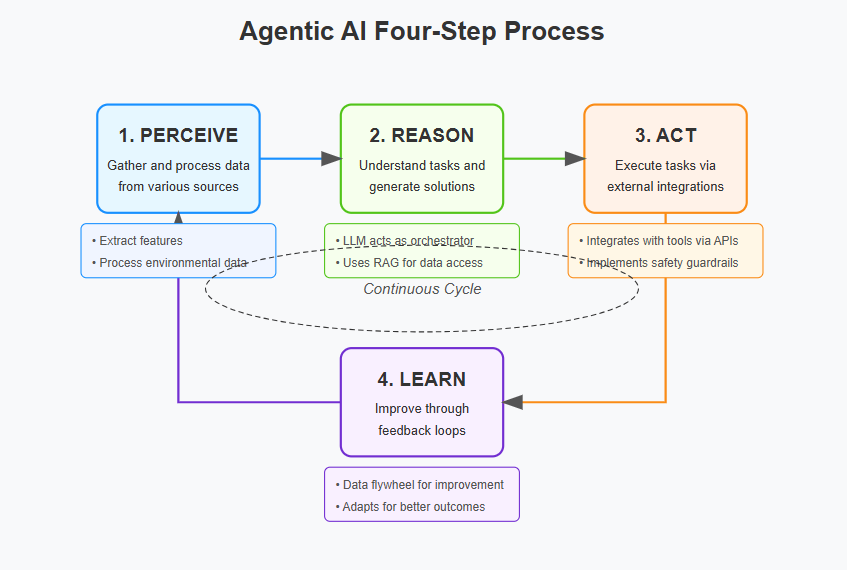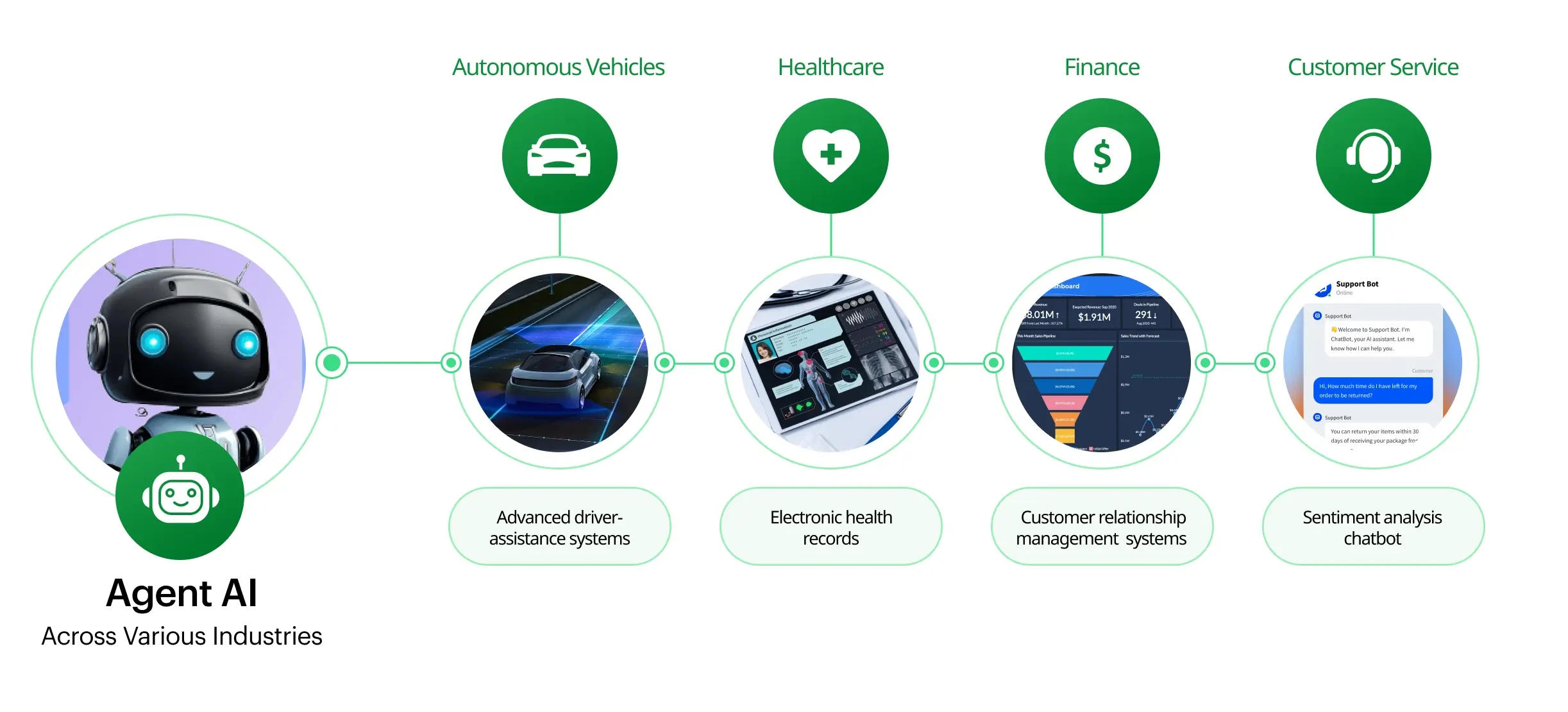Agentic AI : The Next Evolution in Autonomous Intelligence

Yash Raj | Posted on Apr 1, 2025
Table of Contents
Abstract Understanding Agentic AI Core Capabilities of Agentic AI Agentic AI vs. Generative AI: A Comparative Analysis Transforming Industries: Real-World Application Agentic AI & the Future of Decision-Making Agentic AI & Workforce Evolution Conclusion & Future OutlookAbstract
As we approach 2025, Agentic AI is emerging as a transformative force in artificial intelligence. Unlike traditional generative AI, which primarily focuses on content creation and data generation, Agentic AI goes beyond by autonomously making decisions, adapting to dynamic environments, and executing tasks without constant human oversight.
Designed to understand complex scenarios and adjust its behavior in real-time, Agentic AI is revolutionizing industries by enhancing operational efficiency, decision-making, and automation. This article delves into the core principles of Agentic AI, its key characteristics, real-world applications, and its profound implications on business, workforce transformation, and ethical considerations.

Understanding Agentic AI
Agentic AI marks a significant leap in artificial intelligence, offering autonomy, proactive decision-making, and adaptability. Unlike earlier AI models, which followed rigid, rule-based frameworks, Agentic AI can assess situations dynamically and act with minimal human input.
The evolution of AI began with basic algorithms, progressing through machine learning and natural language processing. Generative AI enhanced content creation and data analysis, but it lacked autonomy in complex workflows. Agentic AI fills this gap, enabling AI systems to independently strategize, execute tasks, and refine their actions over time.
How Agentic AI Works? Agentic AI follows a structured four-step process:
- Perceive: Gathers and processes data from multiple sources.
- Reason: Uses advanced models to interpret tasks and generate solutions.
- Act: Executes tasks autonomously via APIs and external tools.
- Learn: Continuously improves through feedback loops.

Unlike traditional AI, which reacts to inputs, Agentic AI proactively solves multi-step problems. For instance, an AI-powered customer service agent can not only answer queries but also analyze balances, suggest payments, and execute transactions.
Agentic AI is redefining human-AI interactions. From planning travel to optimizing supply chains and providing virtual caregiving, its proactive approach is unlocking new possibilities. As AI expert Enver Cetin puts it, "Agentic AI is defined by one word—proactiveness."
Core Capabilities of Agentic AI
Agentic AI is distinguished by its ability to operate autonomously, adapt dynamically, and make intelligent decisions. Its key capabilities include:
- Once given a specified task, agentic AI functions autonomously and with a high degree of autonomy.
- These systems are incredibly flexible, changing their tactics in reaction to data in real-time.
- They can understand difficult situations and make wise decisions because they have context awareness.
- Agentic AI is goal-oriented, concentrating on accomplishing more general objectives that increase its efficacy and value, in contrast to classical AI, which is restricted to carrying out particular tasks.
Agentic AI vs. Generative AI: A Comparative Analysis
Traditional AI systems primarily follow predefined algorithms and structured data, limiting their ability to adapt. Generative AI expanded these capabilities by enabling machines to create content and analyze data. However, it remains reactive, responding only when prompted.
Agentic AI, in contrast, operates autonomously, learning from interactions, adjusting its strategies, and proactively taking actions to achieve broader objectives. This fundamental shift makes Agentic AI function more like an active collaborator rather than a passive tool.
Comparison Table: Agentic AI vs. Generative AI| Feature | Generative AI | Agentic AI |
|---|---|---|
| Autonomy | Requires user input to generate responses | Fully autonomous, requires minimal human input |
| Decision-Making | Generates content based on trained patterns | Context-aware, adapts in real-time |
| Task Execution | Responds to queries, creates content | Proactively executes multi-step processes |
| Learning Capability | Limited learning, relies on pre-trained models | Learns from interactions, self-improving |
| Objective | Focuses on content generation | Achieves broader goals with strategic actions |
| Use Cases | Text/image generation, summarization, translation | Business automation, dynamic decision-making, intelligent workflows |
Transforming Industries: Real-World Application
Agentic AI is revolutionizing industries by enabling automation, intelligent decision-making, and adaptive workflows. Its ability to operate autonomously and optimize processes makes it a game-changer across multiple domains.
The potential applications of agentic AI are vast, limited only by creativity and expertise. From simple tasks like generating and distributing content to more complex use cases such as orchestrating enterprise software, AI agents are transforming industries.

- Customer Service: AI-powered agents handle inquiries, resolve issues, and provide personalized support without human intervention.
- Finance: Enhances fraud detection, manages risk, and automates financial advisory services.
- Healthcare: Automates diagnostics, assists in patient care, and optimizes hospital workflows.
- Autonomous Vehicles: Enhances self-driving technology by improving navigation, traffic management, and real-time decision-making.
- Retail & E-commerce: Personalizes customer recommendations, manages inventory, and optimizes pricing.
- Software Development: Automates coding tasks, bug detection, and software deployment.
Agentic AI & the Future of Decision-Making
By offering practical insights from enormous datasets, AI-driven decision-making improves processes. These computers have the ability to examine patterns and trends that human analysts might not figure out instantly.
Agentic AI-powered predictive analytics enables companies to successfully predict shifts in the market and customer behavior. AI in business automation that uses predictive analytics experiences an average revenue boost of 10-15%, per a report from Forrester Research.
Agentic AI & Workforce Evolution
The rise of Agentic AI is reshaping the workforce landscape. While it automates routine tasks, it also creates new opportunities for collaboration between humans and AI systems. This evolution requires a shift in skill sets, emphasizing creativity, critical thinking, and emotional intelligence.
Agentic AI is changing work roles in a wide range of industries by automating repetitive tasks. Surveys anticipate that there will be new opportunities in fields like data analysis and system administration, even as other jobs might become outdated. Organizations must fund employee reskilling programs to adjust to these developments. According to a PwC report, 74% of employees are open to retraining or learning new skills for their existing positions due to technology improvements and AI technology trends.
Conclusion & Future Outlook
Agentic AI is undeniably the next frontier in artificial intelligence, representing a breakthrough in autonomous systems capable of making decisions and learning independently. This evolution opens doors to smarter, more efficient machines that can interact with the world in ways that closely mimic human intelligence. The integration of Agentic AI into various industries promises to drive innovations in automation, optimization, and problem-solving across fields such as healthcare, finance, manufacturing, and more.
However, as we embrace this technology, we must remain vigilant of the challenges it presents. Ethical dilemmas surrounding accountability, decision-making, and biases in AI systems are significant hurdles that must be addressed. Ensuring transparency in AI decision-making processes, as well as establishing frameworks for safety and control, will be crucial for building trust in these systems.

Looking ahead, the future of Agentic AI is both exciting and uncertain. Advancements in machine learning, neural networks, and quantum computing could accelerate the capabilities of these systems, enabling them to take on even more complex tasks with greater efficiency. As the technology matures, it’s likely that Agentic AI will not only work autonomously but also collaborate with humans in creative and innovative ways, becoming an indispensable tool in solving some of the world’s most pressing challenges.
To fully realize the potential of Agentic AI, we must strike a balance between innovation and regulation. By prioritizing ethical considerations, creating robust regulatory frameworks, and ensuring inclusive development, we can unlock a future where AI enhances human capabilities without compromising values of fairness, privacy, and accountability. The journey toward a fully autonomous and agentic AI-powered future is just beginning, and its impact on society will be profound.

Have any questions or feedback?
Feel free to send me a message!
Or, email me directly:
References
[1] Nvidia article: What Is Agentic AI? -Erik Pounds
Visit Article
(accessed Mar 2025).
[2] Agentic AI: How Autonomous AI Systems Are Shaping the Future of Business [2025]
-E&ICT Academy, IIT Kanpur
Visit Article
(accessed Mar 2025).
[3] IBM Agentic AI: 4 reasons why it’s the next big thing in AI research -Cole Stryker
Visit Article
(accessed Mar 2025).
[4] Harvard Business Review: What Is AgenticAI, and How It Will Change Work?
-Mark Purdy
Visit Article
(accessed Mar 2025).